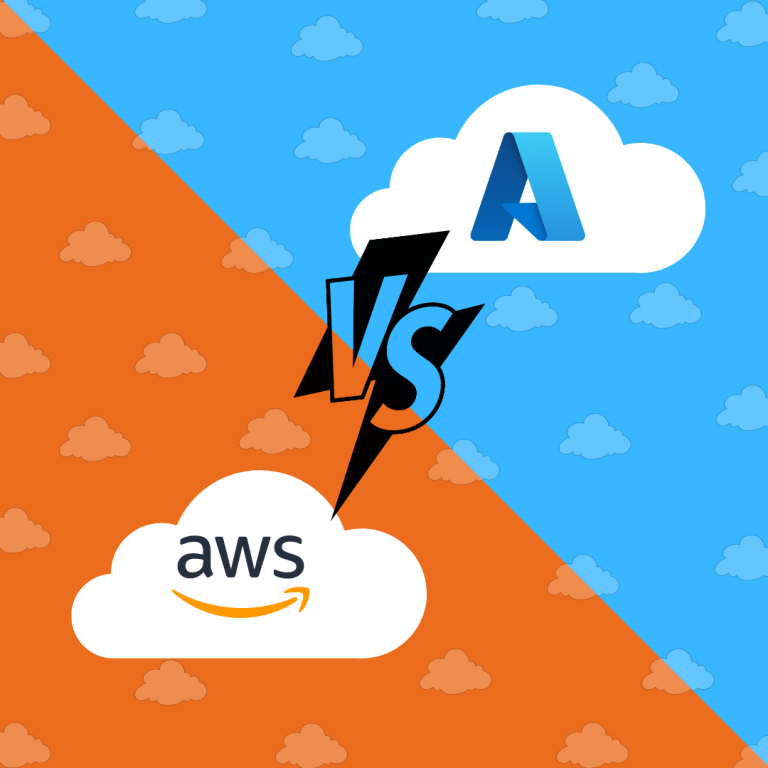Table of Contents
- 1. Introduction
- 2. What is AWS?
- 3. What is Azure
- 4. Difference between AWS & Azure
- 5. AWS vs Azure: Which is better for your career?
Introduction
In this cloud war, Amazon Web Services and Microsoft’s Azure are superheroes in their own power – connecting many lives and making the world a superior spot.
Thousands of lives have benefited from cloud storage companies. Cloud deployment can offer hundreds of options, even if it is the simplest. Accordingly, the market is extremely competitive, and like some other areas, It has two market pioneers AWS and Azure competing to be the BEST apparatus. Now the question is, how do we decide between AWS and Azure? We will try to determine this by examining multiple factors, such as cloud storage, pricing, databases, and networks.
What is AWS?
Amazon Web Service (AWS) is a cloud-based web-facilitating platform that gives quick, adaptable, dependable, and savvy answers to organizations and associations. AWS offers a large number of administrations through building blocks that can be utilized to create and send different applications in the cloud climate. One of the novel highlights of AWS is its Crossover Capacities, which empower clients to incorporate on-premises framework with AWS administrations consistently. Besides, AWS offers per-hour charging, going with it a more sharp decision for associations wanting to utilize cloud organizations.
What is Azure?
Azure is a distributed computing stage and administration given by Microsoft. It offers an extensive variety of cloud administrations, including virtual machines, data set administrations, examination, and stockpiling, and that’s only the tip of the iceberg, which can be utilized to fabricate, send, and oversee different applications and administrations in the cloud. Azure is known for its versatility, security, and adaptability, and is utilized by organizations of all sizes across different ventures. It is a main cloud specialist co-op on the lookout, rivalling other key part like AWS and Google Cloud.
Differences between AWS & Azure
Storage
AWS: Data is efficiently stored and delivered with AWS’s Simple Storage Service (S3), the industry-standard storage solution for objects and large blocks.
Azure: Azure provides import-export, site recovery, and additional backup options for retrieval and archival. Azure’s primary storage is Microsoft’s cloud, which was well-designed to address your current data storage issues. Azure stores your temporary data effectively using disk drives, file system services, blocks, and file system services.
Networking
AWS: Amazon offers its clients a virtual confidential cloud (VPC) and guarantees persistent, dependable administrations utilizing a broad structure across 210 edge areas worldwide locales. Thus, they’re ready to give a lightning-quick reaction, quick conveyance, and rapid organization.
Azure: Microsoft provides its clients with a virtual network (VNET), which has locations in more than 60 global regions. They are able to provide services that are safe, adaptable, and quick because they usually try to keep their traffic within the Azure network.
Database
AWS: Relational databases are used by AWS for longevity and are compatible with MariaDB, Oracle, PostgreSQL, MySQL, and Amazon Aurora database engines. Besides, it offers Versatile Reserve for storing needs and DynamoDB for NoSQL.
Azure: Azure uses MySQL, PostgreSQL, and SQL for relational databases, Redis Cache for caching requirements, and Cosmos database for NoSQL services compared to AWS.
Computing Power
AWS: E2C (Elastic Compute Cloud) from Amazon Elastic Beanstalk and AWS Lamda are two of the best computing services that AWS offers. They have a lot of adaptability and can automatically scale and monitor your cloud apps. AWS additionally has its own holder advancements like Kubernetes administrations. You can select an operating system with the assistance of a variety of Amazon Machine Images (AMI) available in the Marketplace. Machines can be set up with cores and memory defined.
Azure: Azure is one of the leading players in cloud computing regarding AWS versus Azure services. It works with virtual machines, container services, app functions, and other infrastructures. You can pick from SQL Server, Firewall, Ubuntu, NextGen WebApp, SharePoint Server, Red Hat Linux, or Windows Server templates in the Azure Marketplace. You can select your preferred market region and the standard VM size.
Content Delivery
AWS: CloudFront is AWS’s content delivery network, and it is easy to get started with and integrate with the straightforward storage service. It’s accessible at an entirely reasonable cost and consequently an incredible choice for new companies.
Azure: With real-time analytics and improved security, Azure’s CDN solution lets users deliver fast, high-bandwidth content to customers. It is scalable enough to handle high loads and cache content from publicly accessible Azure storage blobs.
Security
AWS: The AWS cloud platform is one of the oldest and most mature cloud platforms, so it has faced a wide range of problems and found solutions accordingly. In addition, it offers data loss protection, API activity monitoring, threat intelligence via Guard Duty, and isolation through granular IAM and security groups (firewall).
Azure: A key feature of Azure is its central security structure, which can be controlled from one location. Azure makes it possible for you to implement security measures at each and every layer of your app stack, from networking and compute storage to identity and control management.
Cost
AWS: The Amazon Web Services company charges by the hour, with instances available for purchase; On-demand- pay only for what you use; Spot- bid for additional capacity; and Reserved- pay upfront for 1-3 years of service.
Azure: Azure, on the other hand, charges by the minute and has a pricing model that is more precise than AWS’s. It likewise offers momentary certifications, permitting you to pick either month-to-month or prepaid charges
Who wins the war between AWS/Azure?
Considering all of these factors, choosing the best tool becomes more difficult. We have attempted to investigate the principal perspectives for coming to a choice on AWS versus Azure. Multiple data center hosting is something that businesses that require high availability and resilience should think about. Contrasting Azure and AWS based on estimating is very extreme as both the goliaths keep on sending off new valuing designs, items, and new combinations. As a result, AWS wins out over Azure for the business and its employees, who can choose between the two equally useful platforms based on their requirements and priorities.
If you want to get certified in AWS or Azure, click on the link given below:
https://javabykiran.com/amazon-web-service-aws-certification-training-institute-in-pune/
Are you looking to enhance your cloud skills
Table of Contents
- 1. Introduction
- 2. What is AWS?
- 3. What is Azure
- 4. Difference between AWS & Azure
- 5. AWS vs Azure: Which is better for your career?
Introduction
In this cloud war, Amazon Web Services and Microsoft’s Azure are superheroes in their own power – connecting many lives and making the world a superior spot.
Thousands of lives have benefited from cloud storage companies. Cloud deployment can offer hundreds of options, even if it is the simplest. Accordingly, the market is extremely competitive, and like some other areas, It has two market pioneers AWS and Azure competing to be the BEST apparatus. Now the question is, how do we decide between AWS and Azure? We will try to determine this by examining multiple factors, such as cloud storage, pricing, databases, and networks.
What is AWS?
Amazon Web Service (AWS) is a cloud-based web-facilitating platform that gives quick, adaptable, dependable, and savvy answers to organizations and associations. AWS offers a large number of administrations through building blocks that can be utilized to create and send different applications in the cloud climate. One of the novel highlights of AWS is its Crossover Capacities, which empower clients to incorporate on-premises framework with AWS administrations consistently. Besides, AWS offers per-hour charging, going with it a more sharp decision for associations wanting to utilize cloud organizations.
What is Azure?
Azure is a distributed computing stage and administration given by Microsoft. It offers an extensive variety of cloud administrations, including virtual machines, data set administrations, examination, and stockpiling, and that’s only the tip of the iceberg, which can be utilized to fabricate, send, and oversee different applications and administrations in the cloud. Azure is known for its versatility, security, and adaptability, and is utilized by organizations of all sizes across different ventures. It is a main cloud specialist co-op on the lookout, rivalling other key part like AWS and Google Cloud.
Differences between AWS & Azure
Storage
AWS: Data is efficiently stored and delivered with AWS’s Simple Storage Service (S3), the industry-standard storage solution for objects and large blocks.
Azure: Azure provides import-export, site recovery, and additional backup options for retrieval and archival. Azure’s primary storage is Microsoft’s cloud, which was well-designed to address your current data storage issues. Azure stores your temporary data effectively using disk drives, file system services, blocks, and file system services.
Networking
AWS: Amazon offers its clients a virtual confidential cloud (VPC) and guarantees persistent, dependable administrations utilizing a broad structure across 210 edge areas worldwide locales. Thus, they’re ready to give a lightning-quick reaction, quick conveyance, and rapid organization.
Azure: Microsoft provides its clients with a virtual network (VNET), which has locations in more than 60 global regions. They are able to provide services that are safe, adaptable, and quick because they usually try to keep their traffic within the Azure network.
Database
AWS: Relational databases are used by AWS for longevity and are compatible with MariaDB, Oracle, PostgreSQL, MySQL, and Amazon Aurora database engines. Besides, it offers Versatile Reserve for storing needs and DynamoDB for NoSQL.
Azure: Azure uses MySQL, PostgreSQL, and SQL for relational databases, Redis Cache for caching requirements, and Cosmos database for NoSQL services compared to AWS.
Computing Power
AWS: E2C (Elastic Compute Cloud) from Amazon Elastic Beanstalk and AWS Lamda are two of the best computing services that AWS offers. They have a lot of adaptability and can automatically scale and monitor your cloud apps. AWS additionally has its own holder advancements like Kubernetes administrations. You can select an operating system with the assistance of a variety of Amazon Machine Images (AMI) available in the Marketplace. Machines can be set up with cores and memory defined.
Azure: Azure is one of the leading players in cloud computing regarding AWS versus Azure services. It works with virtual machines, container services, app functions, and other infrastructures. You can pick from SQL Server, Firewall, Ubuntu, NextGen WebApp, SharePoint Server, Red Hat Linux, or Windows Server templates in the Azure Marketplace. You can select your preferred market region and the standard VM size.
Content Delivery
AWS: CloudFront is AWS’s content delivery network, and it is easy to get started with and integrate with the straightforward storage service. It’s accessible at an entirely reasonable cost and consequently an incredible choice for new companies.
Azure: With real-time analytics and improved security, Azure’s CDN solution lets users deliver fast, high-bandwidth content to customers. It is scalable enough to handle high loads and cache content from publicly accessible Azure storage blobs.
Security
AWS: The AWS cloud platform is one of the oldest and most mature cloud platforms, so it has faced a wide range of problems and found solutions accordingly. In addition, it offers data loss protection, API activity monitoring, threat intelligence via Guard Duty, and isolation through granular IAM and security groups (firewall).
Azure: A key feature of Azure is its central security structure, which can be controlled from one location. Azure makes it possible for you to implement security measures at each and every layer of your app stack, from networking and compute storage to identity and control management.
Cost
AWS: The Amazon Web Services company charges by the hour, with instances available for purchase; On-demand- pay only for what you use; Spot- bid for additional capacity; and Reserved- pay upfront for 1-3 years of service.
Azure: Azure, on the other hand, charges by the minute and has a pricing model that is more precise than AWS’s. It likewise offers momentary certifications, permitting you to pick either month-to-month or prepaid charges
Who wins the war between AWS/Azure?
Considering all of these factors, choosing the best tool becomes more difficult. We have attempted to investigate the principal perspectives for coming to a choice on AWS versus Azure. Multiple data center hosting is something that businesses that require high availability and resilience should think about. Contrasting Azure and AWS based on estimating is very extreme as both the goliaths keep on sending off new valuing designs, items, and new combinations. As a result, AWS wins out over Azure for the business and its employees, who can choose between the two equally useful platforms based on their requirements and priorities.
If you want to get certified in AWS or Azure, click on the link given below:
https://javabykiran.com/amazon-web-service-aws-certification-training-institute-in-pune/


![JBK-diwali-offer-desktop-strip-1700+1700[1] JBK-diwali-offer-desktop-strip-1700+1700[1]](https://javabykiran.com/wp-content/uploads/2019/12/JBK-diwali-offer-desktop-strip-170017001-scaled.webp)






